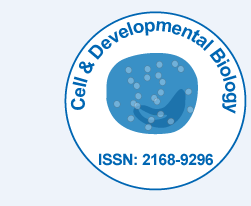
Cell & Developmental Biology
Open Access
ISSN: 2168-9296

ISSN: 2168-9296
Opinion - (2023)Volume 12, Issue 4
The diploid cell is a fundamental concept in biology and genetics. It forms the basis of sexual reproduction in most eukaryotic organisms, including humans. This note explores the definition, characteristics, and significance of diploid cells in genetic inheritance. We will delve into the mechanisms of diploid cell formation, explore their role in sexual reproduction, and discuss the importance of maintaining genetic stability. Additionally, we will highlight how errors in diploid cell division can lead to genetic disorders and cancer. Understanding the intricacies of diploid cells enhances our comprehension of life's diversity and the complexities of inheritance. In the world of biology, the concept of the diploid cell is of paramount importance. Living organisms are composed of cells, the fundamental building blocks of life, and diploid cells represent a crucial form of these units. The term "diploid" refers to the number of sets of chromosomes present in a cell. In most eukaryotic organisms, including humans, diploid cells contain two sets of chromosomes-one inherited from each parent. This note will explore the characteristics, formation, and role of diploid cells in genetic inheritance.
Characteristics of diploid cells
Diploid cells possess several key characteristics that set them apart from haploid cells, which only contain one set of chromosomes. Some of the important features of diploid cells include
• Diploid cells contain two complete sets of chromosomes. For humans, this means 23 pairs of chromosomes, for a total of 46 chromosomes.
• Each chromosome in one set has a corresponding homologous chromosome in the other set. These homologous chromosomes carry genes for the same traits.
• Most of the cells in a multicellular organism are diploid, and they are called somatic cells. Somatic cells play critical roles in carrying out the organism's functions.
• Diploid cells can undergo meiosis, a specialized cell division process that leads to the formation of haploid gametes (sperm and eggs) for sexual reproduction.
Formation of diploid cells
Diploid cells are formed through a process called fertilization, which occurs during sexual reproduction. When a sperm cell (haploid) from the father fertilizes an egg cell (haploid) from the mother, they combine their genetic material to form a diploid zygote. The zygote then undergoes mitotic cell divisions to produce a multicellular organism, with all its cells carrying the same diploid genome.
During fertilization, the fusion of gametes results in the restoration of the diploid chromosome number. This is essential for maintaining the species' genetic stability and diversity, as it combines genetic material from both parents, leading to genetic recombination.
Role of diploid cells in genetic inheritance: Diploid cells play a crucial role in genetic inheritance as they are responsible for passing on genetic information from one generation to the next. The process of sexual reproduction involving diploid cells leads to genetic diversity in offspring, allowing for adaptation to changing environments and evolution over time.
Genetic diversity and adaptation: The recombination of genetic material during meiosis increases genetic diversity among offspring. This genetic variation provides a greater chance for a population to adapt to changing environmental conditions. It allows natural selection to act upon different traits, leading to the survival and reproduction of individuals with advantageous traits.
Inheritance of genetic traits: Genetic traits are inherited from parents to offspring through the diploid cells. Genes are segments of DNA that encode specific traits, and they are passed down from both parents to the child through the process of fertilization and the formation of a diploid zygote.
Importance of maintaining genetic stability: While genetic diversity is crucial for adaptation, maintaining genetic stability within an organism is equally important. The faithful replication of diploid cells during mitosis ensures that the genetic information remains consistent throughout the organism's life, with each cell carrying the same genetic blueprint. Despite the highly regulated processes in place, errors can occur during cell division, leading to aneuploidy. Aneuploidy refers to the presence of an abnormal number of chromosomes in a cell, either too many or too few. This condition can arise during meiosis or mitosis and can have severe consequences for the organism.
Genetic disorders: Certain genetic disorders result from aneuploidy. Down syndrome, for example, is caused by the presence of an extra copy of chromosome 21 (trisomy 21). This additional chromosome leads to developmental and cognitive challenges in affected individuals.
Cancer and chromosomal instability: Cancer is another consequence of errors in cell division. Some cancer cells exhibit chromosomal instability, where they gain or lose chromosomes during cell division. This instability can lead to uncontrolled cell growth and the development of tumors.
In summary, diploid cells form the foundation of genetic inheritance in most eukaryotic organisms. They play a vital role in sexual reproduction, passing on genetic traits from one generation to the next, and promoting genetic diversity within populations. Understanding the characteristics and importance of diploid cells enhances our knowledge of life's complexity and the mechanisms of inheritance. Moreover, recognizing the significance of maintaining genetic stability underscores the importance of precise cellular processes in ensuring the proper functioning and survival of organisms.
Citation: Bathula A (2023) Fundamental Unit of Genetic Inheritance of Diploid cell. Cell Dev Biol. 12:297.
Received: 07-Jun-2023, Manuscript No. CDB-23-25878; Editor assigned: 09-Jun-2023, Pre QC No. CDB-23-25878 (PQ); Reviewed: 23-Jun-2023, QC No. CDB-23-25878; Revised: 30-Jun-2023, Manuscript No. CDB-23-25878 (R); Published: 07-Jul-2023 , DOI: 10.35248/2168-9296.23.12.297
Copyright: © 2023 Bathula A. This is an open-access article distributed under the terms of the Creative Commons Attribution License, which permits unrestricted use, distribution and reproduction in any medium, provided the original author and source are credited.